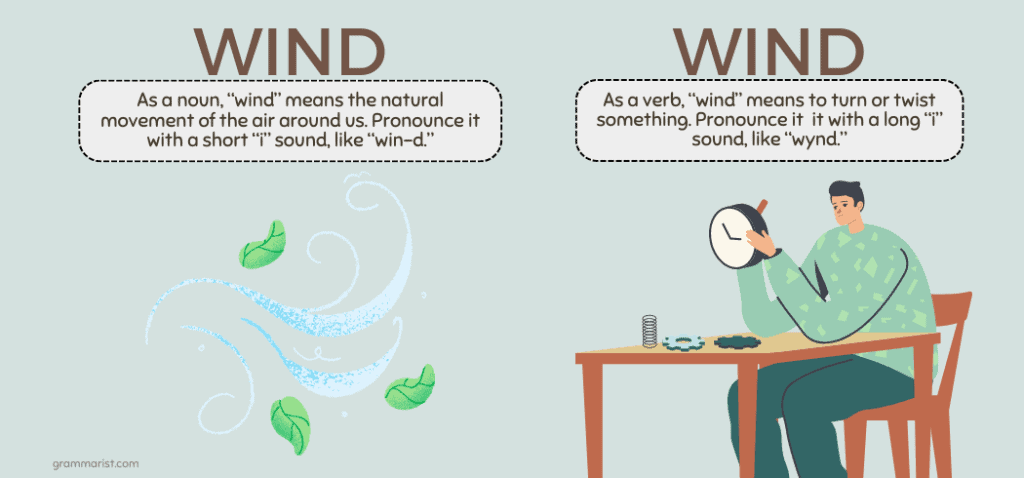Did you know that depending on how you use the word wind, the meaning and pronunciation can be completely different? In fact, “wind” is the perfect example of a heteronym — a word with multiple meanings and pronounced differently depending on the context. But how can you tell the difference if they’re spelled the same? I’ll explain everything you need to know.
Wind vs. Wind: What’s the Difference?
You can say “wind” in two different ways, and it has two distinct meanings. The noun meaning is the movement of air, and the verb meaning is turning or twisting something.
One exception is in the UK, where the word wind (as in air) is used to describe someone farting. They say things like “breaking wind” or “passing wind.” But, I guess, in a sense, it’s all still wind of some kind!
Wind Noun Meaning
As a noun, “wind” means the natural movement of the air around us, which is usually controlled by differences in temperature and pressure. This could be as simple as a gentle breeze or as big as a powerful gust of wind during a storm/hurricane.
Wind Verb Meaning
But, as a verb, “wind” means to turn or twist something. You can wind a clock to get it started or wind a rope around a post to secure it. But it’s pronounced differently, which I’ll get to in a moment.
Is It Wind Up or Wined Up?
One thing I often see cause confusion is “wind up,” as in “to wind up a toy.” The correct way to say it in this context is with the long “i” sound, so it would sound like “wined up” but is still spelled as “wind up.”
How to Pronounce Wind and Wind
If you’re talking about how air moves or anything weather-related, pronounce it with a short “i” sound, like “win-d.”
But, when talking about turning, spinning, or twisting something, you say it with a long “i” sound, like “wynd.”
What Are the Homonyms of Wind?
As confusing as it looks, the homonym of “wind” is actually “wind” and vice versa. The difference is in the sound.
Verbs for Wind
Regarding wind as in air:
- Gusty
- Gale
- Blow
- Blowing
- Huff
- Breezy
In regard to wind, as in to wind up:
- Twist
- Turn
- Spin
- Rotate
Using Wind (Air) in a Sentence
- I can’t believe the wind today; I nearly lost my hat!
- What is that awful smell? Did you break wind?
- The wind blew the top off our garage during the hurricane last year.
- It’s supposed to be super windy today, so make sure to bundle up and wear a hood.
Using Wind (to Twist) in a Sentence
- Do your homework if you don’t want to wind up like your brother failing Math.
- You have to wind that old clock to get it to work.
- Don’t wind up the dog this late at night!
- If she keeps winding the swing like that, she will get dizzy.
Don’t Wind Up Mistaken
Whether you’re talking about the movement of air or twisting something, knowing the difference between the two meanings of “wind” can help you avoid confusion and communicate better.
Check out some others we covered:


